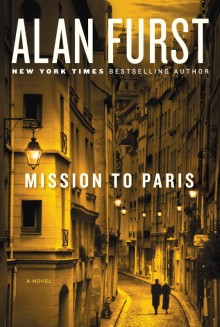Books |
Alan Furst: Mission to Paris
By
Published: Jan 30, 2023
Category:
Fiction
If you try to convey your enthusiasm for “Mission to Paris” to someone who has never read any of Alan Furst’s novels, you may have a hard time. These are spy thrillers by category, but the main characters aren’t usually spies; in this book, the hero is a Hollywood movie star who, in 1938, is “loaned out” to a Parisian producer to play the lead in a French film. In total violation of convention, Furst’s novels feature romance, invariably with women who are not swimsuit models. As for suspense, even before you start a Furst novel set in Europe during the run-up to World War II, you know at least part of the ending — the hero is not going to kill Hitler and save the world.
“Mission to Paris” begins with an explanatory note:
In the 1930s, the Nazi government of Germany, bitterly resentful at having lost the 1914 war, determined to destroy its traditional enemy, France. Force of arms lay in the future, but a small bureau in the Reich Foreign Ministry undertook operations to weaken French morale and degrade France’s will to defend herself. This strategy, using ancient and well- proven methods, was known as political warfare.
Dirty money. An eternal theme, announced in the very first paragraphs:
In Paris, the evenings of September are sometimes warm, excessively gentle, and, in the magic particular to that city, irresistably seductive. The autumn of the year 1938 began in just such weather and on the terraces of the best cafés, in the famous restaurants, at the dinner parties one wished to attend, the conversation was, of necessity, lively and smart: fashion, cinema, love affairs, politics, and, yes, the possibility of war – that too had its moment. Almost anything, really, except money. Or, rather, German money. A curious silence, for hundreds of millions of francs – tens of millions of dollars – had been paid to some of the most distinguished citizens of France since Hitler’s ascent to power in 1933. But maybe not so curious, because those who had taken the money were aware of a certain shadow in these transactions and, in that shadow, the people who require darkness for the kind of work they do.
The distinguished citizens, had they been willing to talk about it, would have admitted that the Germans, the political operatives who offered the bounty, were surprisingly adept. They knew how to soften a conscience, presented bribery as little more than a form of sophisticated commerce, of the sort that evolves in salons and offices and the private rooms of banks — a gentleman’s treason. And the operatives could depend on one hard-edged principle: those who style themselves as men of the world know there is an iron fist in every velvet glove, understand what might await them in the shadows and so, having decided to play the game, they will obey its rules. Still, human nature being what it is, there will forever be somebody won’t.
The tension between the lively start of the fall season in Paris and the conversation no one wants to have is about German money. About the way that money compromises the rich Frenchmen who take it. About the presence of shady characters. So very contemporary! [To buy the paperback from Amazon, click here. For the Kindle edition, click here. To read the first chapter, click here.]
The first chapter follows a French fool who absconds with enough of that German money to live comfortably in another country for years. Think he gets away? Or do you think we see, in brisk, no nonsense prose, the efficiency of the German operation in France — in 1938? All of that suggests what awaits Fredric Stahl when he arrives in Paris to make a movie. He’s no matinee idol: “He couldn’t punch another man, he wasn’t Clark Gable, and he couldn’t fight a duel, he was not Errol Flynn. But neither was he Charles Boyer — he wasn’t so sophisticated. Mostly he played a warm man in a cold world.
The Germans, knowing Stahl was born in Vienna, are interested in him. And they want so little: come to Berlin, just to judge a festival of films about mountains. $10,000 for a day’s work. Lufthansa will fly him over and back.
Stahl is less than interested. But then he gets a taste of German commitment to the triumph of the Reich. (As Goebbels’s people liked to say, “We don’t send out press releases. We send out operatives, and then other people send out press releases.”)
“You’re not a spy,” the officer tells him. “That takes nerves of steel, and soon enough becomes a full-time job.” A “but” follows: “If, in your time here you, ah, stumble on something, something important, it wouldn’t be a bad idea if you let me know about it.”
And that happens.
If you read rapidly, it’s not just because Furst has done his homework, plotted carefully and is a masterful writer — it’s also because his main characters are drawn into espionage by circumstance, and even more, by character. They see clearly that there are good guys and bad guys, and at some point, you’ve got to decide where you stand. So although these novels are about Europe in the years before World War II, they’re also exquisite little morality plays about right now, right here.


